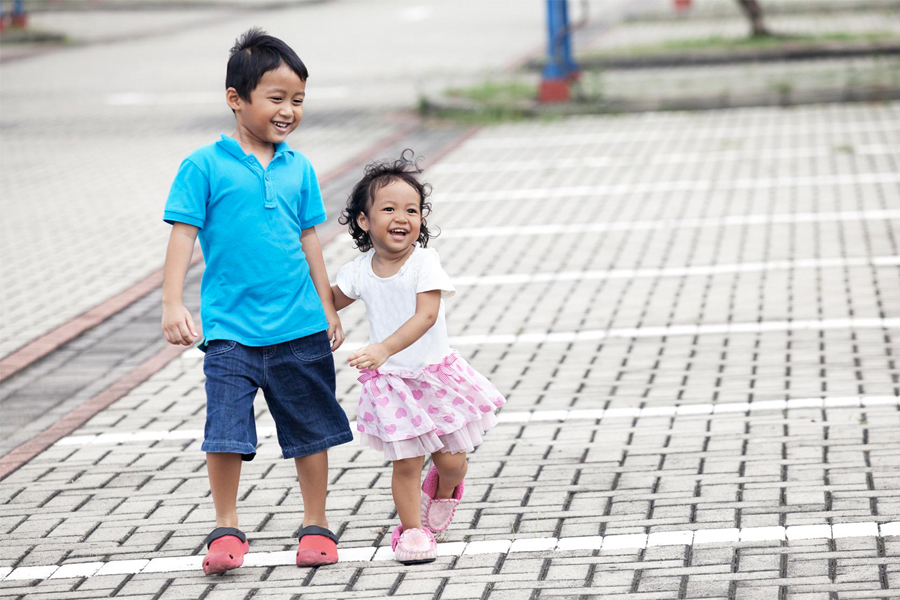by John McMahon
In her 17 years as a foster parent, Kathy Willis has learned a lot. One of the most important lessons? Being in foster care is not easy.
“Children come into care due to trauma,” Willis says, referring to the abuse and neglect that typically precede foster care placement. “Then by placing them in care, we’re yanking them out of everything they know. Placement is almost an additional trauma to these children.”
This is why Willis is passionate about maintaining and honoring connections between siblings in foster care. “Keeping brothers and sisters together is so important,” she says. “Children gain a support system by being together.”
Research supports this idea. Studies show that when placed together with at least one of their siblings, children experience an enhanced sense of safety and fewer emotional and behavioral problems.
They may also experience better outcomes. For instance, studies have linked joint placement of siblings to increased placement stability and to greater likelihood of permanency through reunification, adoption, or guardianship.

In fact, keeping siblings connected makes such a difference it is required by law. The federal Fostering Connections to Success and Increasing Adoptions Act of 2008 (P.L. 110-351) mandates agencies make reasonable efforts to place siblings together unless it is contrary to a child’s safety or well-being to do so. And North Carolina’s Foster Care Children’s Bill of Rights (G.S. 131D-10.1) states that for children and youth in foster care the first priority should be placement in a home with a sibling and that they should have access to “appropriate communication measures” to maintain contact with any sibling who does not live with them.
Connected While Living Apart
Back in 2019, Kathy Willis started caring for half a sibling group that had been split up: two brothers were in her care and two more brothers were in a different foster home. From the outset, Willis made sure the two sets of siblings visited each other frequently. She also tried to bring the boys together every way she could, including by providing respite for the other foster family so all four boys could be together. This situation altered earlier this year when the parents of the other brothers retired from fostering. Kathy Willis saw this change as an opportunity. Today Ms. Willis is parenting three of the brothers. The oldest, age 18, is enrolled in North Carolina’s Foster Care 18-21 program and lives in another placement.
According to Willis, the initial adjustment to this new arrangement wasn’t easy for everyone— especially the 18-year-old. “At first he felt like he was all alone,” she says. “But then we started having day visits and weekend visits. He needed to feel that connection.” Things have settled down, Willis says. “He knows he is not alone and is being very successful right now.” He’s working with his foster father and has earned several promotions on the job.
Thriving Together
As for the three boys in her care, Ms. Willis says things are going very well. “We model for them what a healthy family looks like. We provide the tools they need to begin to heal.”
“We actually have cards we work with that allow the children to talk about things like, How are you dealing with grief? or How do you deal with stressors?”
“And because they feel secure with their siblings, they’re able to open up. One will share something and the others will say, ‘Oh, my gosh, don’t think about it that way! You need to think about it this way.’ There’s so much processing that goes on! They’re so much healthier because they’re together.”
Staying Motivated
Kathy Willis says exchanges like these and other small daily successes help keep her motivated and focused on maintaining and honoring sibling connections.
“Sibling relationships provide continuity of important attachments for the children we serve. Those attachments help us move towards healthy relationships. And isn’t that our goal? We provide children the best tools so they can make healthy decisions to help heal and ultimately to become resilient. And resiliency is something we all need.”
Ways Agencies Can Support Sibling Placements
- Siblings should have the same worker, if possible.
- Place children in homes as geographically near to each other as possible.
- When a family is recruited to foster sibling groups, don’t fill up the home with individual children just because the beds are there. Some programs provide a stipend for families without placements, as an incentive to remain with the agency and keep beds open until a sibling group needs placement.
- Siblings can be placed in stages, so the foster home is not overwhelmed and each child can integrate into the family.
- Provide extra supports to help the family deal with logistics—transportation, assistance with tasks such as school registration, day care, etc.
- Make services such as training and respite care available and accessible.
- Encourage/start support groups in which resource families can share and learn from one another. Families who have adopted sibling groups have the capacity to act as mentors, support networks, and recruiters.
- Make sure resource families, especially kin, receive all the financial support to which they are entitled.
- Ask community members and businesses to help support resource families by donating or providing at a lower cost items such as vans, bunk beds, etc.
- If siblings must be placed separately, maintain the sibling relationship through joint therapy sessions, shared vacations, shared respite care, and by placing siblings in the same neighborhood or school district.
 Marti, age 16
Marti, age 16
My siblings mean the world to me because we were there for each other through all the ups and downs that we experienced with our birth mom. They are the only ones who understand me. I was the mom most of the time because I am the oldest and they would always tell me what was on their mind. I miss growing up with them. I wish on a star every night to see them again soon. It never comes true. There are four of us. We haven’t been a major part of each other’s lives for eight years now. They have a different dad than I do and he don’t see how much I care about them. Honestly, I don’t think he cares. The most important thing is that they are happy and have what they need. My brothers and sister mean everything to me and I would do anything in my power for them. I want them to know that I love them with all my heart. I will see them again one day soon—I promise.
Reprinted from Fostering Perspectives, v. 14, no. 1 (Nov. 2009)


